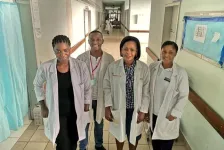(Press-News.org) [Toronto, March 11, 2024] — Little is known about the willingness of sexual minority adults—people who identify as gay, lesbian, bisexual, or other nonheterosexual orientation identities—to use digital health tools. A new study, published in the Journal of Medical Internet Research by Dr Wilson Vincent of Temple University, has shed light on this question in the context of public health screening and tracking. The research challenges assumptions about the uptake of such technologies, particularly amidst the COVID-19 pandemic.
Dr Vincent notes that past studies have seldom looked into how willing sexual minority groups are to use digital health tools, particularly in relation to pandemics or non-HIV prevention measures. In the COVID-19 era, use of cutting-edge mHealth tools such as smartphone apps for screening, monitoring, and treating the virus has skyrocketed, marking a thrilling advancement in health care technology. Yet, how enthusiastic are people about embracing these new technologies?
To answer this question, Dr Vincent used data from the COVID Impact Survey, which was conducted during the height of the COVID-19 response in the United States and surveyed over 2000 people. A deep dive into this publicly available data set revealed that sexual minority adults showed a greater willingness to use digital health tools for screening and tracking compared to heterosexual adults. Interestingly, there were no notable differences in this group in terms of age, gender, or race/ethnicity. On the flip side, White heterosexual adults showed a disproportionately low willingness to use such tools.
The findings show how important it is to make digital health tools work for everyone. Diverse populations should be considered in the development and implementation of digital health strategies, particularly during public health crises. By understanding and meeting the needs of sexual minority adults, policymakers and health care workers can make health strategies better and fairer for all.
The study also highlights the need for ongoing research into the digital divide among different demographic groups. Gaining insights into the factors that shape one's readiness to interact with digital health tools can guide the creation of tailored interventions aimed at closing current disparities in health care accessibility and adoption. Future studies that delve into the various dynamics involved can help create health care solutions that work for everyone, no matter their sexual orientation or other demographic factors.
Please cite as:
Vincent W
Willingness to Use Digital Health Screening and Tracking Tools for Public Health in Sexual Minority Populations in a National Probability Sample: Quantitative Intersectional Analysis
J Med Internet Res 2024;26:e47448
doi: 10.2196/47448
URL: https://www.jmir.org/2024/1/e47448
###
About JMIR Publications
JMIR Publications is a renowned publisher with a long-standing commitment to advancing digital health research and progressing open science. Our portfolio includes a wide array of prestigious open access, peer-reviewed journals dedicated to the dissemination of high-quality research in the field of digital health. JMIR Publications is celebrating its 25th anniversary in 2024 as the leading open access, digital health publisher.
To learn more about JMIR Publications, please visit jmirpublications.com or connect with us via Twitter, LinkedIn, YouTube, Facebook, and Instagram.
Head office: 130 Queens Quay East, Unit 1100, Toronto, ON, M5A 0P6 Canada
Media contact: communications@jmir.org
The content of this communication is licensed under the terms of the Creative Commons Attribution License (https://creativecommons.org/licenses/by/4.0/), which permits unrestricted use, distribution, and reproduction in any medium, provided the original work, published by JMIR Publications, is properly cited.
END
UNIST has once again been internationally recognized for maintaining the highest standard of quality in its business education programs.
On February 26, UNIST proudly announced that the School of Business Administration, the Graduate School of Technology and Innovation Management, and the Graduate School of Interdisciplinary Management have successfully renewed their accreditation in business education from the prestigious Association to Advance Collegiate Schools of Business (AACSB).
This renewal of accreditation by AACSB underscores the exceptional quality of business programs at UNIST, with the university initially earning AACSB accreditation in 2018. UNIST holds the distinction ...
A groundbreaking technology that enables the real-time display of colors and shapes through changes in nanostructures has been developed. This innovative technology, pioneered by Professor Kang Hee Ku and her team in the School of Energy and Chemical Engineering at UNIST, has the potential to revolutionize various fields, such as smart polymer particles.
Utilizing block copolymers, the research team has achieved the self-assembly of photonic crystal structures on a large scale, mimicking natural phenomena observed ...
Americans' basic confidence in science and scientific expertise was unshaken by the Trump administration's attacks on scientific expertise, and has remained high during the last six decades, according to an analysis led by the University of Michigan.
Trump's attacks on scientific experts—exemplified by criticism of Anthony Fauci, former director of the National Institute of Allergy and Infectious Diseases—increased the level of partisan polarization in the United States and made the question of scientific expertise more salient ...
Natural products have unique chemical structures and biological activities and can play a pivotal role in advancing pharmaceutical science. In a pioneering study, researchers from Shinshu University discovered Inaoside A, an antioxidant derived from Laetiporus cremeiporus mushrooms. This breakthrough sheds light on the potential of mushrooms as a source of therapeutic bioactive compounds.
The search for novel bioactive compounds from natural sources has gained considerable momentum in recent years due to the need for new therapeutic ...
Researchers at Weill Cornell Medicine have shown that three months of social worker follow-up support to people hospitalized with HIV in Tanzania had health benefits at low cost. The protocol shortened the time it took participants to attend an HIV clinic and to start on antiretroviral therapy after discharge.
However, the study published in JAMA on Mar. 6 found that the care benefits didn’t translate to a decrease in mortality after one year. They compared a group that received extended case management intervention with a control group receiving ...
University of Michigan researchers have identified the protein that enables mammals to sense cold, filling a long-standing knowledge gap in the field of sensory biology.
The findings, published in Nature Neuroscience, could help unravel how we sense and suffer from cold temperature in the winter, and why some patients experience cold differently under particular disease conditions.
"The field started uncovering these temperature sensors over 20 years ago, with the discovery of a heat-sensing protein called TRPV1," said neuroscientist Shawn ...
Emergency planners in Shanghai and New York City face increasing pressure to protect elderly citizens from the devastating impact of coastal flooding caused by storms and cyclones, a new study reveals.
Both cities are highly exposed to storm-induced flooding and analysis shows that - with two distinct systems of emergency operation – there are significant differences between them in evacuating elderly people to safety.
After studying emergency operations in the cities, experts devised a blueprint for efficient evacuation that could be used in similar flood-threatened cities around the globe such as Mumbai, Bangkok, Jakarta, Ho Chi Minh City, Miami, ...
Peer-reviewed – survey - people
More than a third of people who self-identify as having a smell disorder have had at least one gas safety scare in the last five years, according to new research.
The study, led by the University of East Anglia (UEA) in collaboration with the charity Fifth Sense, asked people who cannot smell well what safety concerns they had and if they had experienced any hazardous events.
A total of 432 people responded to the online survey, which was conducted from February 25 to September 28, 2022, and distributed via the charity.
It ...
At school, he was inspired by Schrödinger´s book ‘What is Life?’. Now, several decades later, Leonid Sazanov is awarded the Erwin Schrödinger Prize by the Austrian Academy of Sciences (ÖAW). The scientist heads a research group at the Institute of Science and Technology Austria (ISTA) and was honored “for his outstanding achievements in the field of structural biology of membrane protein complexes.” Sazanov is the sixth ISTA scientist to receive the prestigious Schrödinger Award.
“I am especially ...
New research indicates that individuals with persistent and worsening metabolic syndrome—which encompasses conditions such as high blood pressure, elevated blood sugar, excess abdominal fat, and abnormal cholesterol—face an elevated risk of developing various types of cancer. The findings are published by Wiley online in CANCER, a peer-reviewed journal of the American Cancer Society.
In the study, 44,115 adults in China with an average age of 49 years were categorized into 4 different trajectories based on trends from ...




